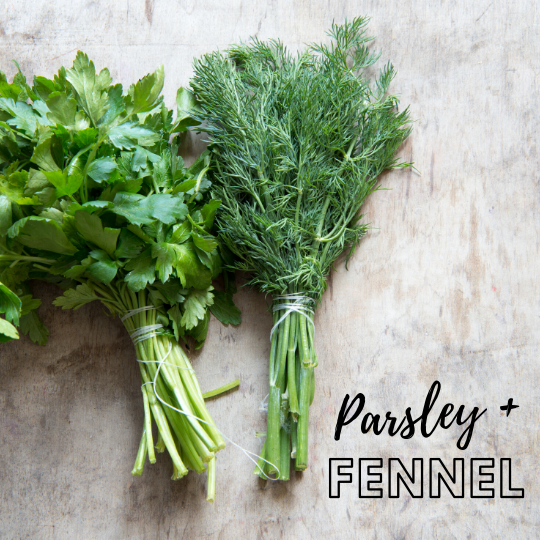Gas and bloating is no fun. But, it is one of the most common digestive issues. Pressure, abdominal pain and uncomfortable changes in the waistline are not only annoying, but also indicative of digestive imbalance. One simple solution is herbs! The good news is that if you eat these herbs to improve your digestion, gas and bloating won’t be a problem anymore!
While gas can form anywhere in the digestive tract, it largely results from bacterial action/fermentation in the large intestine.
When undigested foods make their way through the digestive tract, microbes there break them down and gases are sometimes released. Carbohydrates and legumes tend to produce more gas as a byproduct of digestion.
Certain herbs can stimulate the secretion of digestive juices that assist the body in digestion and can help to alleviate gas.

PARSLEY & MINT FAMILY HERBS
The parsley family of herbs (fennel, cumin, dill, coriander, anise, and caraway) and the mint family of herbs (peppermint, spearmint) are renowned for suppressing and relieving gas. Studies have shown that the essential oils in these plants are carminative (relieve flatulence), support the stomach and gallbladder to secrete digestive juices, are antiseptic and also help relieve spasms (spasmolytic).
A 2016 study found that anethole, a major constituent in fennel seed, restored delayed gastric emptying. In another trial, 95 percent of study participants taking an herbal mixture containing fennel, as well as dandelion, St. John’s wort, lemon balm, and calendula, experienced complete relief of colitis symptoms, including abdominal pain and cramping, within two weeks.
To use: Enjoy fennel or any of these parsley family seeds, by taking them in capsules, tablets, or tinctures; you can chew the whole seeds, use the leaves as part of your meals or prepare them as tea. This gorgeous salad features thinly sliced fennel bulb and fennel seeds. Give it a try!

GINGER
Ginger root is a warming herb that is a traditional remedy for nausea, gas and bowel issues. This herb is useful for reducing gut spasms, neutralizing toxins in the GI tract, and boosting digestive juice secretion, including bile and saliva. Studies show that ginger enhances fat digestion by stimulating bile and pancreatic lipase enzymes.
To use: Preparing ginger as a tea and drinking it after a large meal to ease discomfort is not only flavorful, but also fragrant! For bloating, drinking ginger tea three times a day, or as much as needed to ease bloating is what many digestive experts advise. Ginger can be eaten raw and used as a flavoring for sauces, broths, dressings, etc. Pickled ginger is a deliciously spicy treat that is a great addition to any Buddha bowl or salad!

BLACK PEPPER
Perhaps the easiest herb to add to a meal, black pepper is one that you likely have in your cabinet or on your table right now! The main active constituent of black pepper, Piperine, is known for increasing bioavailability and absorption of nutrients. It is commonly paired with other herbs in herbal supplements to increase absorption. Piperine works in part by increasing intestinal motility, which in tern can help reduce gas.
Try: Adding cracked black pepper to your food. Add cracked peppercorns to boiling water to make a spicy tea (with ginger it is a bit more palatable!). Another option is to use capsules that contain piperine or black pepper extract.
Are gas and bloating an issue for you? Does your digestion impact your life? Ever find yourself unsure about participating in an activity or an outing because you don’t know if a bathroom will be available? Are your clothes uncomfortable or tight after meals? Is flatulence a problem?
Guess what? You’re not alone! These are among the most common concerns that I hear from patients. Let’s get you feeling more comfortable. Click here and schedule a FREE discovery call. We’ll take 15 minutes together, talk about your needs and I’ll let you know how I can help.

